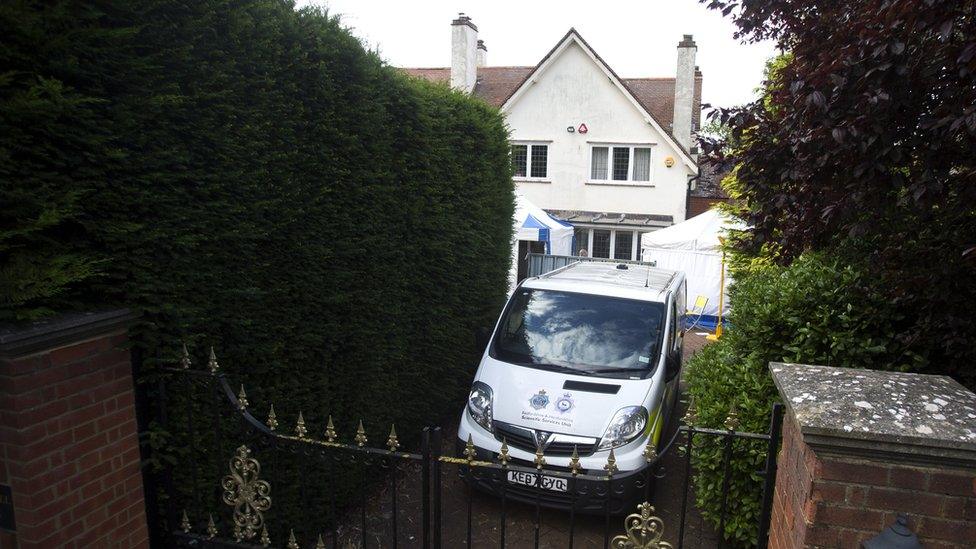Helen Bailey death: Author 'may have been alive' in cesspit
- Published

Author Helen Bailey was last seen alive on 11 April
Children's author Helen Bailey may have been alive when she was dropped into a cesspit at her home, a court has heard.
The 51-year-old was found in the grounds of her home in Royston, Hertfordshire, in July. She had been missing for three months.
Her partner, Ian Stewart, 56, has denied murdering her.
Pathologist Dr Nathaniel Cary told St Albans Crown Court it was "possible that she was put down the well in an unconscious state and then drowned".
Ms Bailey's body was discovered in a cesspit beneath the garage submerged in liquid, including human excrement, the court heard.

Helen Bailey's body was found in a pit beneath the garage of the Royston home she shared with Ian Stewart
More on this and other news from Hertfordshire
The body of her dachshund Boris was found next to her, together with a dog's toy.
The Northumberland-born author of the Electra Brown series for teenagers, had last been seen alive on 11 April.
The cause of Ms Bailey's death was officially listed as "undetermined", Dr Cary said.
Post-mortem tests showed no signs of injury. There were no broken bones, no evidence of bruising or brain bleed, he told the jury.
Analysis of her hair found traces of the sedative Zopiclone, which had been prescribed to Mr Stewart, had been in her system for several months and was present at the time of her death.
Toxicologist Dr Mark Piper said side effects of the drug could include short term memory loss perhaps leading someone to think "their mind was playing tricks".
The jury was told earlier that in the weeks before her death the writer had emailed friends describing how she felt confused and mentally impaired.

The prosecution alleges Ian Stewart murdered Ms Bailey for her money
Pathologist Dr Cary said if she had been sedated, Ms Bailey could have been killed without visual injuries by more "subtle" means.
"Subtle modes of death include smothering and compression of the neck by means including an arm lock, using the crook of the elbow... also called a sleeper hold, it is used in certain martial arts to reduce consciousness."
Cross-examined by defence counsel Simon Russell Flint QC, Dr Cary said he was speculating, but added: "On the basis of the case as a whole, it is my opinion that not only was she concealed by a third party but it seems likely she died at the hands of the third party by some means."
He added: "It is possible that she was put down the well in an unconscious state and then drowned... but impossible to confirm that given the amount of time the body was in water.
"I cannot discount it, it is one of a range of possibilities."

Helen Bailey wrote the Electra Brown books for teenagers
The vet who carried out post-mortem tests on Ms Bailey's dog had been unable to ascertain the cause of death.
No Zopiclone was found in its system and in a statement from Dr Jonathan Williams the jury was told it was not possible to "confirm or refute whether the animal drowned".
The prosecution alleges Mr Stewart, who was due to marry Ms Bailey "imminently", murdered her for her money.
The author was worth "approaching £4m", the court heard earlier.
Mr Stewart denies charges of murder, preventing a lawful burial, fraud and three counts of perverting the course of justice.
The jury has been sent home for the day.
The trial is expected to last seven weeks.